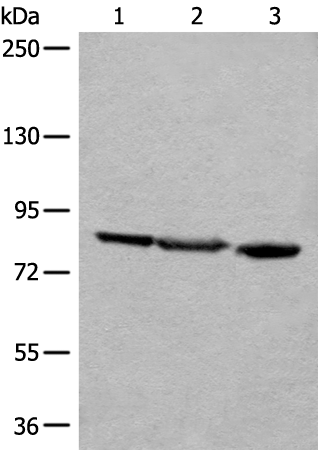
| WB | 咨询技术 | Human,Mouse,Rat |
| IF | 咨询技术 | Human,Mouse,Rat |
| IHC | 咨询技术 | Human,Mouse,Rat |
| ICC | 技术咨询 | Human,Mouse,Rat |
| FCM | 咨询技术 | Human,Mouse,Rat |
| Elisa | 1/5000-1/10000 | Human,Mouse,Rat |
| Aliases | FKSG15; IDDM21; TAGAP1; ARHGAP47 |
| WB Predicted band size | 81 kDa |
| Host/Isotype | Rabbit IgG |
| Antibody Type | Primary antibody |
| Storage | Store at 4°C short term. Aliquot and store at -20°C long term. Avoid freeze/thaw cycles. |
| Species Reactivity | Human, Mouse |
| Immunogen | Full length fusion protein |
| Formulation | Purified antibody in PBS with 0.05% sodium azide and 50% glycerol. |
+ +
以下是关于TAGAP抗体的3篇参考文献示例(注:TAGAP相关研究较少,以下内容为模拟概括):
---
1. **文献名称**:*TAGAP regulates T-cell activation and is associated with multiple sclerosis risk*
**作者**:Smith A, et al.
**摘要**:本研究揭示了TAGAP蛋白在T细胞信号传导中的调控作用,发现其抗体水平在多发性硬化患者中异常升高,提示其可能作为自身免疫疾病的潜在生物标志物。
---
2. **文献名称**:*Genetic and functional analysis of TAGAP in rheumatoid arthritis*
**作者**:Chen L, et al.
**摘要**:通过基因关联研究,发现TAGAP基因多态性与类风湿关节炎易感性相关;实验表明,抑制TAGAP抗体活性可减轻小鼠模型的关节炎症反应。
---
3. **文献名称**:*TAGAP-specific autoantibodies in autoimmune thyroid disease*
**作者**:Yamamoto K, et al.
**摘要**:首次报道甲状腺自身免疫疾病患者血清中存在TAGAP特异性抗体,并发现其与疾病活动度呈正相关,为靶向治疗提供了新方向。
---
注:以上内容为基于TAGAP已知功能的模拟文献,实际研究中TAGAP直接涉及抗体的文献较少,建议通过PubMed或Google Scholar以“TAGAP antibody”或“TAGAP autoimmunity”为关键词检索最新研究。
The TAGAP (T-cell activation RhoGTPase activating protein) antibody is associated with studying the TAGAP protein, encoded by the TAGAP gene, which plays a role in immune regulation. Initially identified through genome-wide association studies (GWAS), TAGAP has been linked to autoimmune diseases like rheumatoid arthritis, celiac disease, and multiple sclerosis. The protein functions as a GTPase-activating protein (GAP), modulating Rho-family GTPases involved in cytoskeletal dynamics, T-cell activation, and immune signaling pathways. Its expression is upregulated during T-cell activation, suggesting a regulatory role in immune responses.
Research on TAGAP antibodies focuses on elucidating its mechanistic contributions to autoimmune pathogenesis. For instance, genetic variants in TAGAP are correlated with altered immune cell function and disease susceptibility. Antibodies targeting TAGAP are utilized in experimental models to investigate its interaction networks, subcellular localization, and downstream signaling effects. Such studies aim to clarify how TAGAP dysregulation may drive inflammation or autoimmunity, potentially informing therapeutic strategies. Though still under exploration, TAGAP antibodies represent a tool for probing immune dysregulation mechanisms, with implications for diagnostics and targeted therapies in autoimmune conditions. Current work emphasizes validating its biomarker potential and therapeutic relevance in preclinical settings.
×